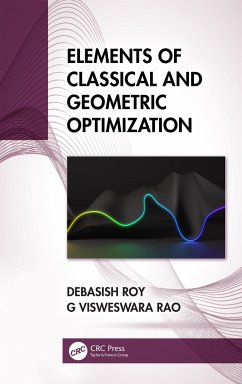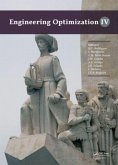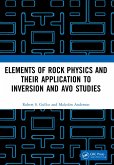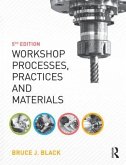Debasish Roy (Karnataka Indian Institute of Science), G Visweswara Rao
Elements of Classical and Geometric Optimization
Debasish Roy (Karnataka Indian Institute of Science), G Visweswara Rao
Elements of Classical and Geometric Optimization
- Gebundenes Buch
- Merkliste
- Auf die Merkliste
- Bewerten Bewerten
- Teilen
- Produkt teilen
- Produkterinnerung
- Produkterinnerung
This comprehensive textbook covers both classical and geometric aspects of optimization using methods, deterministic and stochastic in a single volume. It will help serve as ideal study material for senior undergraduate and graduate students in the fields of civil, mechanical, electrical, electronics and communication engineering.
Andere Kunden interessierten sich auch für
![Engineering Optimization 2014 Engineering Optimization 2014]() Engineering Optimization 2014393,99 €
Engineering Optimization 2014393,99 €![Elements of Rock Physics and Their Application to Inversion and AVO Studies Elements of Rock Physics and Their Application to Inversion and AVO Studies]() Robert S. GullcoElements of Rock Physics and Their Application to Inversion and AVO Studies92,99 €
Robert S. GullcoElements of Rock Physics and Their Application to Inversion and AVO Studies92,99 €![Workshop Processes, Practices and Materials Workshop Processes, Practices and Materials]() Bruce BlackWorkshop Processes, Practices and Materials89,99 €
Bruce BlackWorkshop Processes, Practices and Materials89,99 €![Nonlinear Dynamics of Structures Under Extreme Transient Loads Nonlinear Dynamics of Structures Under Extreme Transient Loads]() Adnan Ibrahimbegovic (France Universite Technologie Compiegne)Nonlinear Dynamics of Structures Under Extreme Transient Loads69,99 €
Adnan Ibrahimbegovic (France Universite Technologie Compiegne)Nonlinear Dynamics of Structures Under Extreme Transient Loads69,99 €![Workshop Technology Part 2 Workshop Technology Part 2]() W. ChapmanWorkshop Technology Part 276,99 €
W. ChapmanWorkshop Technology Part 276,99 €![Microalgae in Waste Water Remediation Microalgae in Waste Water Remediation]() Arun Kumar (India RCP Universe Group of Institutions)Microalgae in Waste Water Remediation267,99 €
Arun Kumar (India RCP Universe Group of Institutions)Microalgae in Waste Water Remediation267,99 €![Blast and Ballistic Loading of Structures Blast and Ballistic Loading of Structures]() John HetheringtonBlast and Ballistic Loading of Structures89,99 €
John HetheringtonBlast and Ballistic Loading of Structures89,99 €-
-
-
This comprehensive textbook covers both classical and geometric aspects of optimization using methods, deterministic and stochastic in a single volume. It will help serve as ideal study material for senior undergraduate and graduate students in the fields of civil, mechanical, electrical, electronics and communication engineering.
Hinweis: Dieser Artikel kann nur an eine deutsche Lieferadresse ausgeliefert werden.
Hinweis: Dieser Artikel kann nur an eine deutsche Lieferadresse ausgeliefert werden.
Produktdetails
- Produktdetails
- Verlag: Taylor & Francis Ltd
- Seitenzahl: 526
- Erscheinungstermin: 25. Januar 2024
- Englisch
- Abmessung: 240mm x 161mm x 33mm
- Gewicht: 922g
- ISBN-13: 9780367560164
- ISBN-10: 036756016X
- Artikelnr.: 67824143
- Herstellerkennzeichnung
- Libri GmbH
- Europaallee 1
- 36244 Bad Hersfeld
- gpsr@libri.de
- Verlag: Taylor & Francis Ltd
- Seitenzahl: 526
- Erscheinungstermin: 25. Januar 2024
- Englisch
- Abmessung: 240mm x 161mm x 33mm
- Gewicht: 922g
- ISBN-13: 9780367560164
- ISBN-10: 036756016X
- Artikelnr.: 67824143
- Herstellerkennzeichnung
- Libri GmbH
- Europaallee 1
- 36244 Bad Hersfeld
- gpsr@libri.de
Debasish Roy, Professor, Department of Civil Engineering, Indian Institute of Science, Bangalore. He obtained his Ph.D. from the Indian Institute of Science, followed by post-doctoral research at the University of Innsbruck, Austria. He has published over 140 research papers in journals of national and international repute. His current research areas include geometrically inspired and gauge theories for continuum mechanics of solids, non-equilibrium thermodynamics of solids and fluctuation relations valid far from equilibrium, defect engineering and metamaterials with acoustic band gaps and optimization based on stochastic search on Riemannian manifolds. G. Visweswara Rao is currently working as an engineering consultant in Bangalore, India. He received his Ph.D. from the Indian Institute of Science, Bangalore, in 1989. He has published several research papers in the areas of structural dynamics specific to earthquake engineering, nonlinear and random vibration, and structural control. His areas of research include non-linear and stochastic structural dynamics.
Contents
Chapter 1 Optimization methods - A preview
1.1 Introduction
1.2 The continuous case - mathematical formulation
1.3 The discrete case - The travelling salesman problem
1.4 Basics of probability theory and random number generation
1.5 The brachistochrone problem
1.6 More on functional optimization: Hamilton's principle
1.7 Constrained optimization problems and optimality conditions
1.8. Functional optimization and optimal control
Concluding Remarks
Exercises
Notations
References
Chapter 2 Classical derivative-based methods of optimization
2.1 Introduction
2.2 Basic gradient methods
2.3 Quasi-Newton methods
2.4 Penalty function methods
2.5 Linear programming (LP)
2.6. Method of generalized reduced gradients
2.7 Method of feasible directions
2.8 Method of gradient projection
Concluding remarks
Exercises
Notations
References
Chapter 3 - Classical derivative-free methods of optimization
3.1 Introduction
3.2 Direct search methods
3.3 Other direct search methods
3.4 Metaheuristics - Evolutionary methods
Concluding remarks
Exercises
Notations
References
Chapter 4 Elements of Riemannian Differential Geometry and geometric
methods of optimization
4.1 Introduction
4.2 Tangent vectors and tangent space on manifolds
4.3 Riemannian (geometric) version of some classical gradient methods
4.4. Statistical estimation by geometrical method of optimization
4.5. Stochastic processes, stochastic calculus and solution of SDEs
4.6. Analogy between statistical sampling and stochastic optimization
4.7. Geometric method of optimization by Riemannian Langevin dynamics
Concluding remarks
Exercises
Notations
References
Chapter 5 Stochastic analysis on a manifold and more on geometric
optimization methods
5.1. Introduction
5.2 Stochastic development on a manifold
5.3. Non-convex function optimization based on stochastic development
5.4. Parameter estimation by GALA
Concluding remarks
Notations
References
Chapter 1 Optimization methods - A preview
1.1 Introduction
1.2 The continuous case - mathematical formulation
1.3 The discrete case - The travelling salesman problem
1.4 Basics of probability theory and random number generation
1.5 The brachistochrone problem
1.6 More on functional optimization: Hamilton's principle
1.7 Constrained optimization problems and optimality conditions
1.8. Functional optimization and optimal control
Concluding Remarks
Exercises
Notations
References
Chapter 2 Classical derivative-based methods of optimization
2.1 Introduction
2.2 Basic gradient methods
2.3 Quasi-Newton methods
2.4 Penalty function methods
2.5 Linear programming (LP)
2.6. Method of generalized reduced gradients
2.7 Method of feasible directions
2.8 Method of gradient projection
Concluding remarks
Exercises
Notations
References
Chapter 3 - Classical derivative-free methods of optimization
3.1 Introduction
3.2 Direct search methods
3.3 Other direct search methods
3.4 Metaheuristics - Evolutionary methods
Concluding remarks
Exercises
Notations
References
Chapter 4 Elements of Riemannian Differential Geometry and geometric
methods of optimization
4.1 Introduction
4.2 Tangent vectors and tangent space on manifolds
4.3 Riemannian (geometric) version of some classical gradient methods
4.4. Statistical estimation by geometrical method of optimization
4.5. Stochastic processes, stochastic calculus and solution of SDEs
4.6. Analogy between statistical sampling and stochastic optimization
4.7. Geometric method of optimization by Riemannian Langevin dynamics
Concluding remarks
Exercises
Notations
References
Chapter 5 Stochastic analysis on a manifold and more on geometric
optimization methods
5.1. Introduction
5.2 Stochastic development on a manifold
5.3. Non-convex function optimization based on stochastic development
5.4. Parameter estimation by GALA
Concluding remarks
Notations
References
Contents
Chapter 1 Optimization methods - A preview
1.1 Introduction
1.2 The continuous case - mathematical formulation
1.3 The discrete case - The travelling salesman problem
1.4 Basics of probability theory and random number generation
1.5 The brachistochrone problem
1.6 More on functional optimization: Hamilton's principle
1.7 Constrained optimization problems and optimality conditions
1.8. Functional optimization and optimal control
Concluding Remarks
Exercises
Notations
References
Chapter 2 Classical derivative-based methods of optimization
2.1 Introduction
2.2 Basic gradient methods
2.3 Quasi-Newton methods
2.4 Penalty function methods
2.5 Linear programming (LP)
2.6. Method of generalized reduced gradients
2.7 Method of feasible directions
2.8 Method of gradient projection
Concluding remarks
Exercises
Notations
References
Chapter 3 - Classical derivative-free methods of optimization
3.1 Introduction
3.2 Direct search methods
3.3 Other direct search methods
3.4 Metaheuristics - Evolutionary methods
Concluding remarks
Exercises
Notations
References
Chapter 4 Elements of Riemannian Differential Geometry and geometric
methods of optimization
4.1 Introduction
4.2 Tangent vectors and tangent space on manifolds
4.3 Riemannian (geometric) version of some classical gradient methods
4.4. Statistical estimation by geometrical method of optimization
4.5. Stochastic processes, stochastic calculus and solution of SDEs
4.6. Analogy between statistical sampling and stochastic optimization
4.7. Geometric method of optimization by Riemannian Langevin dynamics
Concluding remarks
Exercises
Notations
References
Chapter 5 Stochastic analysis on a manifold and more on geometric
optimization methods
5.1. Introduction
5.2 Stochastic development on a manifold
5.3. Non-convex function optimization based on stochastic development
5.4. Parameter estimation by GALA
Concluding remarks
Notations
References
Chapter 1 Optimization methods - A preview
1.1 Introduction
1.2 The continuous case - mathematical formulation
1.3 The discrete case - The travelling salesman problem
1.4 Basics of probability theory and random number generation
1.5 The brachistochrone problem
1.6 More on functional optimization: Hamilton's principle
1.7 Constrained optimization problems and optimality conditions
1.8. Functional optimization and optimal control
Concluding Remarks
Exercises
Notations
References
Chapter 2 Classical derivative-based methods of optimization
2.1 Introduction
2.2 Basic gradient methods
2.3 Quasi-Newton methods
2.4 Penalty function methods
2.5 Linear programming (LP)
2.6. Method of generalized reduced gradients
2.7 Method of feasible directions
2.8 Method of gradient projection
Concluding remarks
Exercises
Notations
References
Chapter 3 - Classical derivative-free methods of optimization
3.1 Introduction
3.2 Direct search methods
3.3 Other direct search methods
3.4 Metaheuristics - Evolutionary methods
Concluding remarks
Exercises
Notations
References
Chapter 4 Elements of Riemannian Differential Geometry and geometric
methods of optimization
4.1 Introduction
4.2 Tangent vectors and tangent space on manifolds
4.3 Riemannian (geometric) version of some classical gradient methods
4.4. Statistical estimation by geometrical method of optimization
4.5. Stochastic processes, stochastic calculus and solution of SDEs
4.6. Analogy between statistical sampling and stochastic optimization
4.7. Geometric method of optimization by Riemannian Langevin dynamics
Concluding remarks
Exercises
Notations
References
Chapter 5 Stochastic analysis on a manifold and more on geometric
optimization methods
5.1. Introduction
5.2 Stochastic development on a manifold
5.3. Non-convex function optimization based on stochastic development
5.4. Parameter estimation by GALA
Concluding remarks
Notations
References








